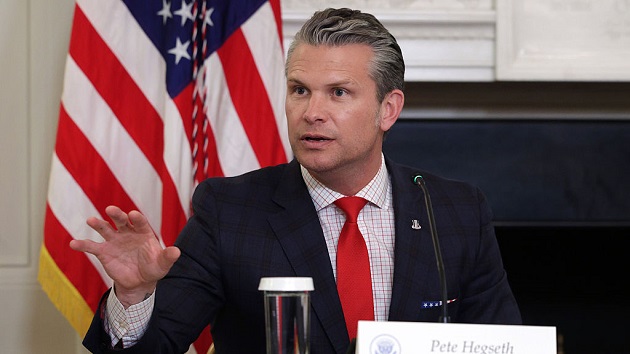Abortion, voting rights, other key issues on the ballot in states this election
Written by ABC Audio. All rights reserved. on October 12, 2024
(WASHINGTON) — While the presidential race may be getting the spotlight this election season, key regulations, laws and policies are on the ballot in several states.
And those ballot measures could have huge ramifications for the rest of the country.
Forty-one states have a combined 147 ballot measures in the 2024 election. While some measures are hyperlocal, some state initiatives dovetail with national topics.
Here are some of the major ballot initiatives in this election.
Reproductive rights
Since the U.S. Supreme Court overruled Roe v. Wade in 2022, voters in a handful of states have turned to ballot measures to enshrine or expand reproductive access in the face of abortion bans.
Ten states in this election season will give their voters a chance to change their laws on the topic.
Arizona, Florida, Colorado, Missouri, Montana, Nebraska and Nevada all have measures that would amend their state constitutions with specific language to protect or recognize the right to an abortion for all constituents.
Nebraska also has another ballot measure that would change the state constitution to prohibit abortions in the second and third trimesters except for cases of “medical emergency or when the pregnancy results from sexual assault or incest.”
New York state has a ballot measure that would change the constitution’s equal rights amendment to protect against discrimination for pregnancy outcomes, including abortion.
South Dakota voters will decide on a measure that would establish a right to an abortion and add an amendment to the state constitution that would determine when the state may regulate abortions.
Vice President Kamala Harris has repeatedly called for the restoration of the reproductive rights established by Roe v. Wade.
Former President Donald Trump, who has taken credit for helping overturn Roe v. Wade, has said on the campaign trail that the states should decide abortion access and indicated he will vote “no” on Florida’s ballot initiative.
Illinois voters will decide on a measure that would advise state officials on whether to provide for medically assisted reproductive treatments, including in vitro fertilization, to be covered by any health insurance plan in Illinois that provides full coverage to pregnancy benefits.
Immigration, voting rights
Even though it is already illegal for non-documented immigrants to register to vote and cast a ballot in federal and state elections, some leaders in states have been pushing laws and measures to prohibit those groups from casting ballots in local elections.
A handful of municipalities have passed laws allowing some noncitizens to vote in certain local races. For example, non-U.S. citizens who have children attending public schools can vote in school board elections in San Francisco, following a 2016 ballot measure.
This year, Idaho, Iowa, Kentucky, Missouri, North Carolina, Oklahoma, South Carolina and Wisconsin have ballot measures that would prohibit noncitizens from voting in state and local elections.
Proponents have argued these laws would secure elections and prevent localities from allowing non-Americans to vote.
However, opponents have emphasized that non-American citizens cannot vote in state and federal elections and the ballot measures are moot.
Six states have already passed ballot measures banning noncitizens: Alabama, Arizona, Colorado, Florida, Louisiana, North Dakota and Ohio.
Ranked choice voting
Under a ranked-choice voting system, or RCV, voters cast a ballot ranking their candidates. If a candidate receives more than 50% of the No. 1 ranking, they win the election.
If no candidate receives that 50% majority, the election goes into an instant runoff.
Election officials will look at the ballots and eliminate candidates with the fewest number of No.1 rankings. The ballots that listed the eliminated candidate as the top choice are then re-examined.
The candidates ranked No. 2 on those ballots are tallied, and those votes are transferred to the remaining candidates. The process continues until one candidate reaches the 50% majority.
Alaska and Maine are the only two states in the nation that hold their state and federal elections using RCV, but that could change after this election.
Nevada and Oregon have ballot measures to change their state and federal elections to RCV. The District of Columbia also has a ballot measure that would change local elections to an RCV method.
Missouri would ban the method if its voters pass a ballot measure that also includes banning noncitizens from voting.
A ballot measure in Alaska would repeal its laws that mandate RCV for state and federal elections. Voters approved a measure in the 2020 election with 50.55%. Two years later, the method came under the national spotlight when an instant runoff decided the Senate race.
Sen. Lisa Murkowski, the incumbent who did not have the support of Republicans following her vote to convict Trump in his second impeachment trial, went on to win the election following the first elimination round.
Republican-controlled legislatures in 10 states -Tennessee, Florida, Idaho, South Dakota, Montana, Kentucky, Alabama, Mississippi, Louisiana, and Oklahoma- have passed laws in the last four years banning RCV from all elections.
LGBTQ+ rights
Voters in a few states will decide on state changes for laws and regulations concerning LGBTQ+ rights.
Colorado and Hawaii voters will vote on a ballot measure that would change their state constitutions to change language and allow same-sex couples the right to marry.
A measure in South Dakota would change male pronouns in the state constitution to gender-neutral terms or titles.
California voters will decide whether to repeal Prop 8, the 2008 voter measure that banned same-sex marriages. The law became invalid after the Supreme Court ruled in 2013 that same-sex marriages were constitutional.
Other major ballot measures
Marijuana laws are potentially up for change in two states this election season.
Florida and South Dakota both have ballot measures that would legalize recreational marijuana for adults over the age of 21. This is South Dakota voters’ third time deciding on the matter in four years.
Voters approved a measure in 2020 to legalize recreational cannabis, but it was struck down by a lawsuit a year later. In 2022, a ballot measure to legalize marijuana failed to pass.
Arizona has a voter initiative that would change state laws to allow for state and local police to arrest noncitizens who cross the border unlawfully and allow for state judges to order deportations.
A North Dakota ballot includes an initiative that would require future ballot measures to be passed by voters in two consecutive elections before it’s approved.
Colorado voters will decide on a measure that, if passed, would levy a 6.5% excise tax on the manufacture and sale of firearms and ammunition. Tax money would go “to fund crime victim services programs, education programs, and mental and behavioral health programs for children and veterans.”
Kentucky has a ballot initiative that would amend the constitution to enable the General Assembly to provide state funding to students who attend private schools.
Copyright © 2024, ABC Audio. All rights reserved.





